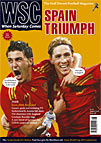 Euro 2008 was a success on the pitch, but off it, the quality of the media coverage was poor and appears stuck in the past
Euro 2008 was a success on the pitch, but off it, the quality of the media coverage was poor and appears stuck in the past
Euro 2008 will be remembered fondly, not just in Spain. There was a lot of good football as a series of teams discovered the virtues of positive play over cautiousness, and there was some glorious drama. Russia disappointed in the end, but were deserved semi-finalists. Turkey’s progress to the same stage was more remarkable; they ran out of luck while putting in their best performance, against Germany, but that 3-2 defeat was the most memorable of a series of fine games.
The Germans, though outclassed in the final, made enterprising use of what opportunities they had to that point, while Croatia, Holland and Portugal all entertained. The team of Andrés Iniesta and David Villa, Xavi and Fernando Torres, Marcos Senna and Iker Casillas, were deserved winners. But though the result was one to cheer for football reasons, the final still brought to mind one of the negative themes that runs through this issue of WSC. Gary Winston Lineker still treats the Germany team as if they were more or less equivalent to the enemy whose defeat led to the choice of his middle name. That was hardly the only piece of unthinking comment on BBC or ITV this June, but remains one of the more depressing and symbolic examples of how much the British football establishment lives in the past.
There was a deluge of advice about who to follow, but it was widely assumed that most UK TV viewers would tacitly support countries who featured players from their own clubs. But there is another subsection of fans, albeit a minority among the replica shirt-wearing multitudes of the 21st century. That is people who will watch pretty much any game in a major tournament, even if it’s a goalless grind. Indeed they might take pride in sitting through such a match in the same way horror buffs would enjoy every visceral moment in a gory film.
In their rush to pander to the passing trade, the broadcasters simply can’t grasp that many watch because they are actively interested in football. It would be naive to hope that this degree of interest might be reflected in the punditry. Instead, once again most of what we heard was received opinion passed off as analysis. From Alan Shearer’s smug diffidence to Mark Lawrenson’s deluded belief that he is a gifted comedian, to Clive Tyldesley’s fanboy obsession with Cristiano Ronaldo, they seem determined not to put any thought into what they are doing. And which international team does that remind you of?
Away from home, the Austro-Swiss flop at Euro 2008 was the first in what may be a sequence of poor performances by host nations. World Cup 2010 hosts South Africa have slipped down the rankings over the past few years and suffered another embarrassing defeat, away to Sierra Leone, in an African Nations Cup qualifier recently. Even if they get a helpful draw in two years’ time they may struggle to advance. Euro 2012 is scheduled to be jointly staged by Ukraine, who have qualified for only one major tournament since independence, and Poland, who disappointed at Euro 2008 just as they did at the last two World Cups.
The hosts’ failures are less significant than they would once have been, as more fans travel to tournaments than ever, creating the necessary atmosphere, even if many of those in face paint and wigs seem to be major-event fans, who may as well be at a rock festival, rather than football diehards. They will provide the backdrop to what really matters to the tournament organisers, the business of football. Even the fanzones had VIP sections, where sponsors could entertain in an atmosphere provided by the thousands of ticketless fans unable to get into stadiums that for the most part had the bare minimum capacity.
Still, there was one problem for UEFA and their friends, an issue related to the repeated references to England and the Premier League in commentary and the papers. What matters to the game’s corporate partners is that the countries with the largest TV markets qualify. Indeed, the more markets, the merrier. Hence, in part, the unanimous vote to expand the tournament from 16 to a ridiculously bloated 24 teams from 2016. How such a competition would be organised is unclear, but it seems no one has recalled the high number of disappointing groups at the 24-team World Cups of 1986, 1990 and 1994, when four third-placed teams advanced from six groups of four, meaning avoiding defeat, not winning, was the key to progressing.
Euro 2008 was enjoyable despite, not because of, most of those who commented on the matches on TV and radio, or wrote about it in the papers. And it was a success despite, not because of, those who run the game – who will now discard a format that works. While Lineker and co are stuck repeating their mistakes, UEFA now want to repeat FIFA’s. And we have to live with them all.
From WSC 258 August 2008